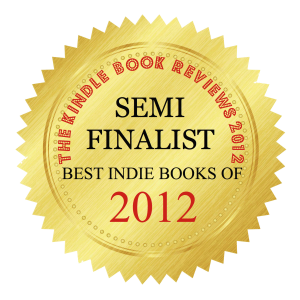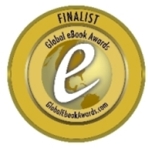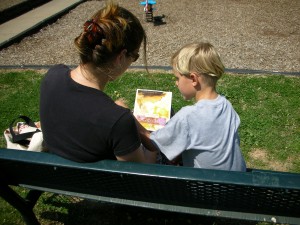Every once in a while, a book hits me at some deep level. I wrote about one such book recently on the blog at Evolved Publishing.
Check this out. Seriously. It’s THAT good.
~~~~~~~~~~
Author, Editor, Publisher, Coach
Every once in a while, a book hits me at some deep level. I wrote about one such book recently on the blog at Evolved Publishing.
Check this out. Seriously. It’s THAT good.
~~~~~~~~~~
I recently announced that my novel, Forgive Me, Alex, is a semi-finalist in the Kindle Book Review’s Best Indie Books of 2012, in the Mystery/Thriller category.
Well, one of the nicest aspects of editing the work of fellow authors is being able to bask in the glow of their success, too. They did the heaviest lifting, of course, as authors always do, but as editor, I got to play my own small part.
One of the books for which I had the pleasure of doing the final edit/polish is also a semi-finalist, in the YA category: Wanted: Dead or Undead by Angela Scott.

“Wanted: Dead or Undead” – Semi-Finalist in the YA category, Kindle Book Review’s Best Indie Books of 2012
And if that’s not enough, another of the books I edited, Lexie World by Kimberly Kinrade, is a finalist in the 2012 Global Ebook Awards, in the Children Literature Fiction category.

2012 Global Ebook Awards – Finalist in Children Literature Fiction category – “Lexie World” by Kimberly Kinrade
I have to say: All in all, I’m having a pretty good week.
~~~~~~~~~~
In this day and age, in a world where everyone is online and engaged in social media and blogging, it’s easier than ever for authors and readers to connect. More than that, however, it’s more important than ever for them to do so, given the new market dynamics.
Two pieces recently posted at the Evolved Publishing website speak to these issues. I would encourage readers to drop in and take a look.
5 Ways To Show Love To Your Favorite Authors – by Kimberly Kinrade
The Art and Necessity of Posting a Book Review – by Ranee Dillon
Indeed, it is becoming increasingly difficult for an author to break in and succeed if he does not engage in the effort to connect with his readers.
As one of those emerging authors, I view this not so much as a nuisance, but as one of the more enjoyable parts of what I do. Sure, it gets to be a burden at times, when struggling to find time to get it all done, but nothing beats talking to a reader who enjoyed what I wrote. It reinforces me, convinces me that I didn’t make a mistake giving up the “day job.”
~~~~~~~~~~
One of the primary concerns that has driven me from Day 1 of my writing career is this: How shall I appeal to readers, so that they will want to read every piece I publish?
Ultimately, the answer is simple: Provide the reader with a great reading value.
Okay. Great. How shall I: (A) Produce the best possible book, and; (B) Convince potential readers to take a chance on it?
Well, I provided part of that answer in an article I posted yesterday: From Evolved Publishing: Our Covenant with Readers
~~~~~~~~~~
The subject of how to deal with online feedback, whether you’re receiving it or doling it out, has been the cause of much angst and excitement.
Won’t you please love me?
As writers who sell directly to our readers, we tend to live and die on the content of our reviews, articles about our work, social media posts praising or blasting our work, and so on. As is the case with any artist, we must have thick skin, for no matter how polished our work, we’ll never please everyone. When we put our work out there, we take on a rather schizophrenic mindset: on the front edge of our sword, we’re the star of the lead float in the parade; on the back edge, we’ve just awoken in the middle of Grand Central Station at rush hour—naked.
Taste is such an extraordinarily subjective thing; my 5-star item may well be your 3-star item. It’s reasonable for us to expect that if our work is worthy of 5 stars in the minds of some, it will nonetheless be worthy of much less in the eyes of others. I recently saw a bestselling book with 148 5-star reviews… and 13 1-star reviews! What? How is that possible? Frankly, it appears some people live to cut down other people’s work. I don’t understand living life that way, but it happens, especially in the anonymous internet age. I tend to discount those few 1s when there are so many 5s.
What really interested me about that bestseller, however, was its mix of ratings at the top: 148 5-star, 132 4-star, 76 3-star. (2-star and 1-star were minimal.) That mix makes clear the subjective nature of art. As artists, we can’t get all panicked and suicidal when a poor (or less than perfect) review pops up. It will happen. It’s inevitable. We cannot please everyone.
Some authors, in particular, are hesitant to post bad reviews—for any number of reasons. For one, they know first-hand how damaging a poor review can be. Second, they may fear retribution. This leads me to the next point.
As ye sow, so shall ye reap?
I watched with some interest recently a little war waged between 4 authors. There was some back and forth on the social media sites, and some nasty reviews flowing in multiple directions. It appears this all started because one author cut down another author’s work. Author #2 took exception, and decided to respond in kind. And the war was on.
I know of many people who have policies about reviewing that go something like this: if I can’t give it at least a 4-star rating, I won’t post anything at all.
Now, I don’t think any of us should be in the business of destroying other people’s dreams. Yet if their work really is substandard, and you can provide constructive feedback to point out the issues, would that not help the author in the long run? Well, yes… if the author accepts it as he should. On the other hand, you might just start an Author War.
This fear drives many people to say nothing at all, when some feedback might be helpful to the author. Furthermore, I think we perform a disservice to readers when we fail to tell then the truth about a substandard book. And who is more important to us authors than our readers?
I try to be honest at all times, but I must admit that I too am selective about when I’ll post a generally negative review. If I see real potential in the piece, if only the author will tackle certain developmental needs, I’ll try to indicate such. On the other hand, if I encounter a piece that makes clear the author should never even consider quitting his day job, I let it go. (Really, what’s the point?)
I love good books. Period. And the more the merrier. Yet a sea of bad books does make it a tad more difficult for the good books to get noticed. The gems will win out in the end, but it may take some real time and effort. It’s made more difficult when people refuse to post poor reviews for books deserving of a low rating. Ah, the dilemma.
Do you have a policy about reviewing?
~~~~~~~~~~
I love books that give me rich, real characters. They must appear as breathing, walking, talking people who live on the page. Do not give me plastic, shallow clichés, please.
Let us take, for example, Atticus Finch in To Kill a Mockingbird
, Harper Lee’s singular masterpiece. Is he an ordinary man engaged in an extraordinary act? Is he an extraordinary man doing what such men do? Is he a simple smalltown lawyer, an easy-going, unobtrusive gentleman hoping to raise his kids well and survive as a single father?
Yes. To all of those, yes. He is a rich, deep character for which we as readers can peel back layer after layer.
Here are some more of my favorite characters:
Santiago, the old Cuban fisherman from Ernest Hemingway’s The Old Man and the Sea
.
Alessandro Giuliani, the World War I vet from Mark Helprin’s A Soldier of the Great War
.
Hawkeye from James Fennimore Cooper’s The Last of the Mohicans
.
Owen Meany, the diminutive but strong protagonist in John Irving’s A Prayer for Owen Meany
.
Jack Reacher from Lee Child’s series of thriller novels.
Myron Bolitor from Harlan Coben’s series of mystery-thrillers.
Odd Thomas from Dean Koontz’s multi-book series.
George Smiley from John Le Carre’s Cold War spy thrillers.
These are just a few, but each of them offers a rich emotional and intellectual depth that brings them to life. What do they look like? I don’t know. I don’t care. How they look is not something that grabs most readers by the throat and compels them to learn more about the characters. We want to know what really makes them tick.
As an author, I seek to create just such characters. Readers will judge whether I’ve succeeded, but early feedback for Forgive Me, Alex looks positive.
———-
Evolved Publishing has put out an anthology resulting from its first-ever Short Story Contest. This collection consists of 10 great stories from 10 talented authors, ranging from fantasy and science fiction, to thrillers, to action/adventure, to mainstream literary.
This collection offers something for everyone, and I, with the help of co-editor D.T. Conklin, have edited the stories, polishing them to a fine sheen.
I absolutely love some of these stories. Come check ’em out.
Available as an eBook at: Amazon ; Smashwords ; BookieJar ; and coming soon to Barnes and Noble, Kobo and Diesel.
———-
Today is Take Your Child to a Bookstore Day nationally. How many of you knew that?
This is a fantastic idea. Kids need to read more, to know the wonder and majesty of the written word, to let their imaginations carry them to worlds created wholly on the page.
Yet with the advent of the eBook, and the slow (or maybe not-so-slow) dwindling of print books, might this laudable event be in jeopardy? The Borders bookstore chain is already gone. Barnes & Noble is cutting back on shelf space, rather drastically in some cases. Mom-and-Pop bookshops are struggling to keep their heads above water—those that haven’t already vanished.
Fewer people are buying print books at all, and those who are do so more often online, or through discounters like Wal-Mart and Target. So where are parents going to take their children in the future?
Perhaps it’s time we started a new tradition: a monthly Read with Your Child day. We could use the third Saturday of each month, for example, and dedicate two hours per month to actually sit down and read with our kids, to talk about books, about their favorite stories and characters—and why they made their choices.
 I remain more convinced than ever that kids must read more, particularly in a world dominated by television and computer games. Use eReaders. Go ahead! I mean, let’s face it: eReaders are right up your kid’s alley. Just read with them. Please! It does for their brain development what TV and computer games cannot.
I remain more convinced than ever that kids must read more, particularly in a world dominated by television and computer games. Use eReaders. Go ahead! I mean, let’s face it: eReaders are right up your kid’s alley. Just read with them. Please! It does for their brain development what TV and computer games cannot.
And then maybe—just maybe—we’ll stop hearing twenty-somethings toss out sentences like this real-life gem: “It’s like… so… I don’t know, kinda like… well, you know what I mean?”
My response: “Well, no, I don’t know what you mean. Perhaps if you spoke English.”
Her response: “OMG! Like… whatever!”
———-
How shall readers connect with those who write, and with their material? And how shall authors build a following?
It hardly matters what you do for a living, or which hobbies interest you, or which sports teams or movie stars or musical acts or authors you like—a social media presence is pretty much a given in modern life. Unless you live in under a rock, or you’re a seasoned citizen who never quite got the hang of them dang computer contraptions (in which case you’re not reading this anyway), you have at the very least a Facebook or Twitter account.
We communicate through the internet. That’s just the world we live in. Even if you only use it to “keep in touch” with that long lost brother who last phoned you in 1992, and who, on those rare occasions when he sees you, has to snap his fingers and scratch his head and say, “What was your name again?”
Yet it’s moved well beyond that. The internet is increasingly where we do business. We look for work on the internet, or seek potential new hires for our company. We study on the internet, or catch up with the news. And yep, we buy and sell on the internet.
Never has that been more evident than in the world of books. EBooks are revolutionizing the way we read and write. If you’re a booklover, you’re already finding old-fashioned bookstores harder to find—a trend that will continue. EBooks and eReaders are here to stay, and to that, brothers and sisters, I say, “Amen!”
For an author like me, it opens up a whole new world of possibilities. That’s the good news. The bad news is that I must now spend a lot of my time not writing, but reaching out to readers. It’s not that I don’t appreciate the opportunity to communicate with those who like my work. I do. I mean, seriously, what author doesn’t want to hear from readers how his work has affected their lives?
Nonetheless, it’s more work—another ball we must juggle… or ten.
It means I must not only embrace the new technologies, I must also educate myself on their proper use. Opinions vary so widely on how best to do this, it seems largely a matter of trial and error for most. However, some folks have already established some expertise in this arena, and they can help you. One of those is Dan Zarrella, whose blog I heartily recommend.
For readers, the new market also considerably changes the dynamics. If you want to keep up with what authors are offering, to remain apace of all that’s happening in the world of books you love, you’ll have to stay tuned-in to various online activities. One of the communities that’s most geared towards readers’ needs is Goodreads. Here, not only can you discover what’s new in the world of books, you can also find out what other readers—potentially millions of them—think about specific books, and engage with them in an interactive community. If you’re a true booklover, you need to be on Goodreads. And I say that not as an author, but as a fellow reader.
You can also peruse reviews at the big eBook retailers such as Amazon (for their Kindle) and Barnes & Noble (for their Nook).
Naturally, where readers go, writers must go. It’s not that we’re stalking readers, it’s just that… well… okay, we’re stalking readers. Really, we just want readers to know about our work. How else can they make an informed decision about whether or not to buy it?
I’ve set up my own Goodreads Author’s Page, as well as a Publisher’s Page for Evolved Publishing, our indie publishing business. I have an Amazon Author’s Page too. Yes, I have a presence at social media sites everywhere (well, seems like everywhere). As an author, I can’t escape it.
Then, of course, there’s this blog, which provides a more detailed and more personal forum to connect with folks. All part of doing business in the 21st century.
Yet what is enough? What is too much? Should I drive, drive, drive people to buy my books, constantly hammering them over the head? Pfft! Like that won’t send readers running to the hills! As a reader myself, I hate that kind of constant barrage.
No, I think a softer approach is required, a gentle touch—followed by huge portions of patience and perseverance. I’ll be talking about the “Soft Sell” in an upcoming blog post, so please stay tuned.
———-
L.M. Stull, friend of authors and readers, has posted a guest blog by author James Wilcox today. I opened up the comments section with a heartfelt response. I think this post is likely to generate some interesting discussion, so stop by and check it out.
The Etiquette of the Reader Review
———-
© 2025 Lane Diamond
Theme by Anders Noren — Up ↑
Please follow me here: